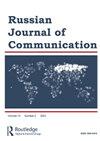数据驱动的研究:概念化第一个俄罗斯实践
Q1 Social Sciences
引用次数: 0
摘要
本期特刊的以下论坛部分是俄罗斯第一个由“俄罗斯传播杂志”发起的学术系列活动的结果——如果我们可以大胆地说,这个活动几乎在活动组织的复杂性中表现了数据转向以及其贡献者所承担的人类和职业道德的明确主题。也就是说,数据驱动的传播对俄罗斯哲学、政治和媒体研究学者意味着什么。以下材料是在俄罗斯主要大学举行的一系列学术会议的成果——在莫斯科罗蒙诺索夫莫斯科国立大学哲学系,在圣彼得堡国立研究大学高等经济学院应用政治科学系,在俄罗斯政治科学协会的支持下,鞑靼斯坦喀山市公共政治和公民社会问题研究委员会以及喀山联邦大学新闻和媒体传播高等学院跨区域人道主义和政治战略中心。在这些公开论坛的基础上,致力于提高公众的关注,并推进有关俄罗斯数据驱动的传播研究和伦理不断变化的世界的学术问题。这些讨论由Anna Kostikova博士(莫斯科国立大学)、Grygory Tulchinsky教授(圣彼得堡高等经济学院)和Leonid Tolchinsky博士(喀山联邦大学)组织和主持。所有的讨论都得到了《俄罗斯传播杂志》主编Igor Klyukanov教授、Ben Peters博士、Robert Couch博士和Marina Shilina教授的支持。我们并不期望论坛能带来思想上的连贯性或简洁的总结;我们希望正好相反。希望每个人都能在这里找到一个广泛的领域,在这些领域中,数据和道德行为是分不开的:在每个贡献的核心及其周围的对话中,都解决了人类关系(或者,作为人类意味着什么)如何与人类所处的数据转换(或者,作为数据意味着什么)相互作用的问题。本文章由计算机程序翻译,如有差异,请以英文原文为准。
Data driven studies: conceptualizing first Russian practices
The following forum portion of this special issue is the result of the first in Russia an academic event series initiated by the ‘Russian Journal of Communication’ – an event that, if we may be so bold, almost performs in the event organization complexity the explicit theme of data turn and human and professional ethics that its contributors take on. Namely, what data driven communication means for Russian scholars in philosophy, political and media studies. The following materials are the outcome of a series of several scholarly meetings spread throughout leading universities throughout Russia – in Moscow at the Philosophy Faculty at Lomonosov Moscow State University, in Saint Petersburg at the Applied Political Science Department at National Research University Higher School of Economics with the support of the Russian Association of Political Science, the Research Committee on Public Politics and Civil Society Problems and TransRegion Humanitarian and Politology Center ‘Strategy’, in Kazan, Tatarstan – at the Higher School of Journalism and Media Communication at Kazan Federal University. Underlying these open forums is commitment to raising public concerns and advancing scholarly questions about the changing world of data driven communication studies and ethics in Russia. These discussions were organized and moderated by Dr Anna Kostikova (Lomonosov Moscow State University), Prof. Grygory Tulchinsky (Higher School of Economics, St. Petersburg) and Dr Leonid Tolchinsky (Kazan Federal University). All the discussions were supported by the ‘Russian Journal of Communication’ editor-in-chief Prof. Igor Klyukanov, Dr Ben Peters, Dr Robert Couch and Prof. Marina Shilina. It’s not expected that forum will lead to intellectual coherence or terse summary; we hope for just the opposite. May everyone find here a wide range of arenas in which data and ethical behavior cannot be separated: at their heart of each contribution and its surrounding conversations beats the question how human relations (or, what it means to be human) interacts with data-lit transformations where humans abide (or, what it means to be data).
求助全文
通过发布文献求助,成功后即可免费获取论文全文。
去求助
来源期刊

Russian Journal of Communication
Social Sciences-Political Science and International Relations
自引率
0.00%
发文量
0
期刊介绍:
Russian Journal of Communication (RJC) is an international peer-reviewed academic publication devoted to studies of communication in, with, and about Russia and Russian-speaking communities around the world. RJC welcomes both humanistic and social scientific scholarly approaches to communication, which is broadly construed to include mediated information as well as face-to-face interactions. RJC seeks papers and book reviews on topics including philosophy of communication, traditional and new media, film, literature, rhetoric, journalism, information-communication technologies, cultural practices, organizational and group dynamics, interpersonal communication, communication in instructional contexts, advertising, public relations, political campaigns, legal proceedings, environmental and health matters, and communication policy.
 求助内容:
求助内容: 应助结果提醒方式:
应助结果提醒方式:


